Defining Formative Assessment
Overall, we’ve done a good job helping students “learn how to learn.” One of the biggest growth opportunities today is to help teachers and students to “know how they know.”
Educators skilled at designing formative assessment practice are able to understand where students are and where they need to be on a daily basis and adapt learning experiences accordingly.
The Council of Chief State School Officers (CCSSO) recently adopted the following definition of formative assessment:
Formative assessment is a planned, ongoing process used by all students and teachers during learning and teaching to elicit and use evidence of student learning to improve student understanding of intended disciplinary learning outcomes, and support students to become more self-directed learners.
~ CCSSO FAST SCASS Austin, Texas, June 2017
Learn more / En savoir plus / Mehr erfahren:
http://www.scoop.it/t/21st-century-learning-and-teaching/?tag=feedback



 Your new post is loading...
Your new post is loading...




















Educators skilled at designing formative assessment practice are able to understand where students are and where they need to be on a daily basis and adapt learning experiences accordingly.
The Council of Chief State School Officers (CCSSO) recently adopted the following definition of formative assessment:
Formative assessment is a planned, ongoing process used by all students and teachers during learning and teaching to elicit and use evidence of student learning to improve student understanding of intended disciplinary learning outcomes, and support students to become more self-directed learners.
~ CCSSO FAST SCASS Austin, Texas, June 2017
Learn more / En savoir plus / Mehr erfahren:
http://www.scoop.it/t/21st-century-learning-and-teaching/?tag=feedback